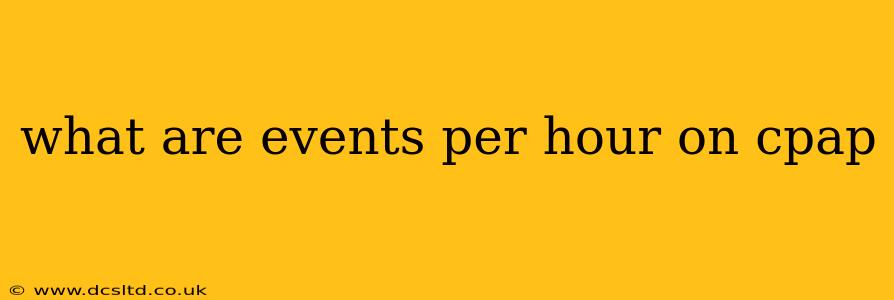Understanding Events Per Hour on CPAP: A Comprehensive Guide
CPAP (Continuous Positive Airway Pressure) therapy is a common treatment for sleep apnea, a condition where breathing repeatedly stops and starts during sleep. A key metric used to monitor the effectiveness of CPAP therapy and the severity of sleep apnea is events per hour (EPH). But what exactly does this mean, and why is it so important? This guide will break down everything you need to know about events per hour on CPAP.
What are Events Per Hour (EPH) in CPAP?
Events per hour, often referred to as apnea-hypopnea index (AHI) in sleep studies, represents the number of breathing disturbances that occur per hour of sleep while using CPAP. These disturbances include:
- Apneas: Complete pauses in breathing lasting at least 10 seconds.
- Hypopneas: Partial reductions in breathing, characterized by shallow breaths or decreased airflow.
- Respiratory Effort-Related Arousals (RERAs): Periods where the body struggles to breathe, often leading to awakenings, even if breathing doesn't completely stop.
A high EPH indicates a greater number of breathing disruptions during sleep, suggesting that the CPAP pressure may be insufficient or that other factors are contributing to sleep apnea. Conversely, a low EPH suggests the CPAP therapy is effectively managing breathing disturbances.
What is a Good EPH on CPAP?
The ideal EPH while using CPAP is generally considered to be less than 5 events per hour. This indicates that the therapy is effectively treating the sleep apnea and allowing for more restful sleep. While some residual events might occur, a low EPH typically translates to improved sleep quality and daytime alertness. However, the specific target EPH may vary depending on individual circumstances and the severity of the sleep apnea. Your doctor will discuss the ideal target for your specific situation.
How is EPH Measured?
EPH is typically measured using a CPAP machine with data logging capabilities. Many modern CPAP machines track and record various data points, including EPH, pressure settings, and hours of use. This data can then be downloaded and reviewed by your sleep specialist to assess the effectiveness of your therapy and adjust settings as needed. Some machines also transmit this data wirelessly for remote monitoring.
What if My EPH is High on CPAP?
A high EPH on CPAP despite using the prescribed settings could indicate several issues:
- Insufficient CPAP Pressure: Your doctor might need to adjust the pressure setting to provide more effective airflow.
- Mask Leaks: A poorly fitting mask or leaks around the mask can significantly reduce the effectiveness of the CPAP therapy and lead to higher EPH. Ensuring a proper seal is crucial.
- Underlying Medical Conditions: Other medical conditions might be contributing to breathing problems. A consultation with your physician is warranted.
- Incorrect CPAP Usage: Not using the CPAP consistently throughout the night or improper equipment use can affect results.
- Obstructive Sleep Apnea (OSA) Severity: In some cases, despite using CPAP, the underlying OSA might be very severe, requiring further intervention.
How Often Should EPH Be Monitored?
The frequency of EPH monitoring depends on individual needs and the stability of your CPAP therapy. Initially, more frequent monitoring might be necessary to optimize settings. Your doctor will usually schedule follow-up appointments to review the data and make any necessary adjustments.
Can I Check My EPH Myself?
Most modern CPAP machines allow you to view your daily or weekly EPH data on the machine's display or through a smartphone app. However, it's crucial to discuss the meaning and implications of your EPH with your sleep specialist. They can interpret the data in the context of your overall health and sleep apnea severity. Don't attempt to self-diagnose or adjust your CPAP settings based solely on the EPH data.
In conclusion, understanding events per hour is essential for managing CPAP therapy effectively. Regular monitoring and communication with your sleep doctor ensure optimal treatment and improve your sleep quality and overall health. Remember, a lower EPH generally indicates more effective CPAP therapy, leading to better sleep and improved well-being.
